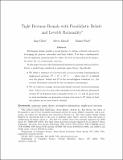Tight Revenue Bounds With Possibilistic Beliefs and Level-k Rationality
Author(s)
Chen, Jing; Micali, Silvio; Pass, Rafael
DownloadTight Revenue Bounds with Possibilistic Beliefs and Level-k Rationality.pdf (524.9Kb)
OPEN_ACCESS_POLICY
Open Access Policy
Creative Commons Attribution-Noncommercial-Share Alike
Terms of use
Metadata
Show full item recordAbstract
Mechanism design enables a social planner to obtain a desired outcome by leveraging the players’ rationality and their beliefs. It is thus a fundamental, but yet unproven, intuition that the higher the level of rationality of the players, the better the set of obtainable outcomes. In this paper, we prove this fundamental intuition for players with possibilistic beliefs, a model long considered in epistemic game theory. Specifically,
• We define a sequence of monotonically increasing revenue benchmarks for single-good auctions, G[superscript 0≤]G[superscript 1≤]G[superscript 2≤]···,where each G[superscript i] is defined over the players’ beliefs and G[superscript 0] is the second-highest valuation (i.e., the revenue benchmark achieved by the second-price mechanism).
• We (1) construct a single, interim individually rational, auction mechanism that, without any clue about the rationality level of the players, guarantees revenue G[superscript k] if all players have rationality levels ≥ k + 1, and (2) prove that no such mechanism can guarantee revenue even close to G[superscript k] when at least two players are at most level- k rational.
Date issued
2015-07Department
Massachusetts Institute of Technology. Computer Science and Artificial Intelligence Laboratory; Massachusetts Institute of Technology. Department of Electrical Engineering and Computer ScienceJournal
Econometrica
Publisher
The Econometric Society
Citation
Chen, Jing, Silvio Micali, and Rafael Pass. “Tight Revenue Bounds With Possibilistic Beliefs and Level-k Rationality.” Econometrica 83, no. 4 (2015): 1619–1639.
Version: Author's final manuscript
ISSN
0012-9682
1468-0262